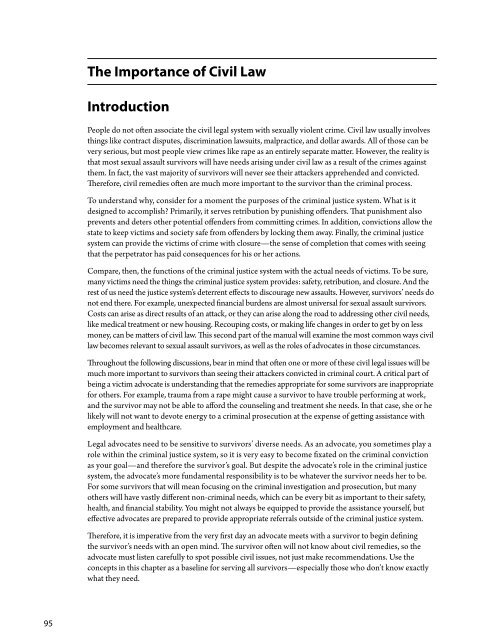Sexual aSSault LEGAL ADVOCACY MANUAL - Texas Association ...
Sexual aSSault LEGAL ADVOCACY MANUAL - Texas Association ...
Sexual aSSault LEGAL ADVOCACY MANUAL - Texas Association ...
Create successful ePaper yourself
Turn your PDF publications into a flip-book with our unique Google optimized e-Paper software.
The Importance of Civil Law<br />
Introduction<br />
People do not often associate the civil legal system with sexually violent crime. Civil law usually involves<br />
things like contract disputes, discrimination lawsuits, malpractice, and dollar awards. All of those can be<br />
very serious, but most people view crimes like rape as an entirely separate matter. However, the reality is<br />
that most sexual assault survivors will have needs arising under civil law as a result of the crimes against<br />
them. In fact, the vast majority of survivors will never see their attackers apprehended and convicted.<br />
Therefore, civil remedies often are much more important to the survivor than the criminal process.<br />
To understand why, consider for a moment the purposes of the criminal justice system. What is it<br />
designed to accomplish? Primarily, it serves retribution by punishing offenders. That punishment also<br />
prevents and deters other potential offenders from committing crimes. In addition, convictions allow the<br />
state to keep victims and society safe from offenders by locking them away. Finally, the criminal justice<br />
system can provide the victims of crime with closure—the sense of completion that comes with seeing<br />
that the perpetrator has paid consequences for his or her actions.<br />
Compare, then, the functions of the criminal justice system with the actual needs of victims. To be sure,<br />
many victims need the things the criminal justice system provides: safety, retribution, and closure. And the<br />
rest of us need the justice system’s deterrent effects to discourage new assaults. However, survivors’ needs do<br />
not end there. For example, unexpected financial burdens are almost universal for sexual assault survivors.<br />
Costs can arise as direct results of an attack, or they can arise along the road to addressing other civil needs,<br />
like medical treatment or new housing. Recouping costs, or making life changes in order to get by on less<br />
money, can be matters of civil law. This second part of the manual will examine the most common ways civil<br />
law becomes relevant to sexual assault survivors, as well as the roles of advocates in those circumstances.<br />
Throughout the following discussions, bear in mind that often one or more of these civil legal issues will be<br />
much more important to survivors than seeing their attackers convicted in criminal court. A critical part of<br />
being a victim advocate is understanding that the remedies appropriate for some survivors are inappropriate<br />
for others. For example, trauma from a rape might cause a survivor to have trouble performing at work,<br />
and the survivor may not be able to afford the counseling and treatment she needs. In that case, she or he<br />
likely will not want to devote energy to a criminal prosecution at the expense of getting assistance with<br />
employment and healthcare.<br />
Legal advocates need to be sensitive to survivors’ diverse needs. As an advocate, you sometimes play a<br />
role within the criminal justice system, so it is very easy to become fixated on the criminal conviction<br />
as your goal—and therefore the survivor’s goal. But despite the advocate’s role in the criminal justice<br />
system, the advocate’s more fundamental responsibility is to be whatever the survivor needs her to be.<br />
For some survivors that will mean focusing on the criminal investigation and prosecution, but many<br />
others will have vastly different non-criminal needs, which can be every bit as important to their safety,<br />
health, and financial stability. You might not always be equipped to provide the assistance yourself, but<br />
effective advocates are prepared to provide appropriate referrals outside of the criminal justice system.<br />
Therefore, it is imperative from the very first day an advocate meets with a survivor to begin defining<br />
the survivor’s needs with an open mind. The survivor often will not know about civil remedies, so the<br />
advocate must listen carefully to spot possible civil issues, not just make recommendations. Use the<br />
concepts in this chapter as a baseline for serving all survivors—especially those who don’t know exactly<br />
what they need.<br />
95
















